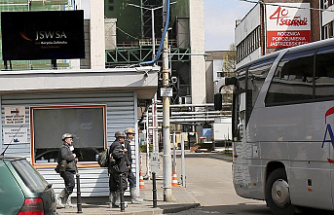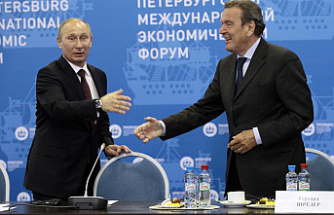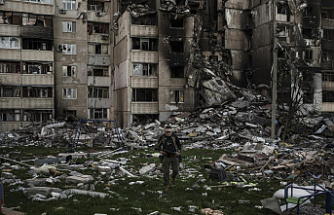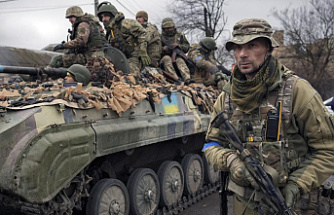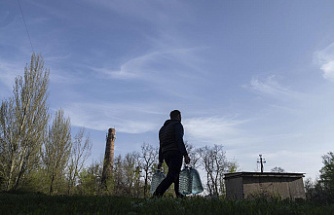Where is Russian President Vladimir Putin going to stop?
This is the question that has thrust America and its allies into an uncertain future. It has cleaved a division between East and West that was not seen since the Cold War. And it has evoked fears of worst-case scenarios that were hard to understand days ago.
Putin knew from the beginning that the U.S. and Western Europe would not assist him militarily . The White House and other governments made it clear that Russia, the country possessing the largest nuclear arsenal in the world, would not be matched up against the defense of Ukraine.
However, this is not the case for Estonia, Poland, Lithuania and Latvia, who are all all members of the alliance. This would theoretically mean that they would be protected by NATO’s Article 5, the principle that states that all allies, even the U.S. , would help any member under attack.
The threats Putin made against Ukraine are seen as a threat to and the Baltic states in particular. He stated that he views Ukraine as historically Russian territory and that he could also claim it.
Lithuania, Latvia, and Estonia are not part of the same cultural and language ties to Russia as Ukraine. They were ruled by Moscow for most of the last 200 years, initially under the Russian Empire and later under the Soviet Union.
All of them voted for independence in 1991 from the USSR and joined NATO in 2004, a result of Putin's long list against the West.
Putin's goal of "reversing the past and returning to Russia's original status as it was over 100 year ago" directly impacts other neighbours, Keir Giles, a senior consultant fellow at Chatham House in London, stated last week. This means Estonia, Latvia and Lithuania, Poland, Finland.
Putin could focus his efforts in Ukraine if his campaign is successful, according to Karin von Hippel (nonpolitical senior advisor at the State Department during Obama's administration).
Georgia and Moldova are not NATO members. However, if Putin "starts slowly expanding his empire", there will be many other NATO countries that will be becoming extremely stressed," stated von Hippel, who is currently the director-general at the Royal United Services Institute, London.
This scenario was unimaginable before Russia invaded Ukraine.
Boris Johnson, the British Prime Minister, told lawmakers in November that the "old concepts of fighting big tanks on European land masses are dead."
Putin's attack on European democracy has broken that preconception.
Russian forces have met stronger-than-expected resistance in Ukraine. Experts and intelligence officers from the West believe that Putin is planning to seize control of the capital to establish a more friendly regime to Moscow.
Putin also has further embedded himself in Belarus. This ally borders Poland and Lithuania and looked more like an ally after hosting some of the Russian troops that marched toward Kyiv.
It is unclear how far Putin will go west in Ukraine -- Washington's allies in NATO are alarmed that he might not stop at Ukraine.
Lithuania declared a state emergency on Thursday. Estonia and Latvia also called for security talks. All three Baltic countries announced that they would ban Russian commercial flights from their skies.
These leaders have been urging European capitals to stop Putin from gaining control of Ukraine in recent weeks.
Gabrielius Landsbergis, Lithuania's Foreign Minister, warned that the battle for Ukraine was a fight for Europe. "If Putin doesn't stop there, he will continue to go further."
Others are less concerned.
Admiral James Stavridis is a former supreme commander of NATO's allied forces and stated last week that he was certain that Putin would not cross a NATO frontier the same way that he crossed the Ukrainian border.
NATO still stated that in the wake Putin's invasion, it would deploy its combat-ready "responseforce" to Eastern Europe for the first time in its history of 73 years. Russia was reminded that NATO's Article 5 commitment was "iron-clad".
It was a moment of clarity for the transatlantic alliance. After the Cold War, it struggled to find relevance and has been labeled "obsolete" and "brain dead” by President Donald Trump.
The sight of tanks advancing into Ukraine has given new meanings to the alliance. Sweden, Finland and Estonia joined the emergency summit last Wednesday. This has led to speculation that they may even abandon their policy of military neutrality after World War II and want to join.
Maria Zakharova (Russia's foreign affairs spokesperson), responded to the idea by warning of "military implications."
Russia is pushing Finland closer than ever to NATO membership, the former Finnish Prime Minister Alexander Stubb stated on Twitter. "We have no other choice but to join at this rate. The Alliance would be strengthened and Northern Europe stabilized if Finland joined.
Regardless of whether that happens or not, there is more potential for miscalculation and escalation between Russia and NATO, which includes three nuclear power in the U.S. and France.
Russia has been isolated more than any other time since the Cold War ended. This was condemned by protests, and thrown out of many sporting and entertainment events.
Germany made a significant policy shift and called Putin's invasion "a turning point". It said that it would send antitank weapons to Ukraine and surface-to air missiles to Ukraine. Even Russia's most recent allies in the region, such as Hungary and the Czech Republic were quick to criticize the Kremlin.
Putin, once viewed by many as a prudent tactician, delivered rants to the camera calling the Ukrainian government officials "drug addicts, neo-Nazis", while ordering a military attack on his democratic neighbor.
Now, the question is: How far can he stretch his ambitions?
Von Hippel stated, "It is very unclear at the stage that anyone can convince Putin not to do what he wants."


